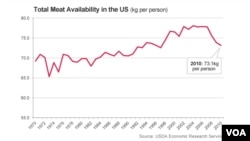WASHINGTON —
For the first time on record, U.S. per-capita meat consumption has declined for four consecutive years, according to the most recent figures from the U.S. Department of Agriculture.
The six percent drop between 2006 and 2010 is the largest sustained decline since recordkeeping began in 1970.
Reasons for the decline are at least partly economic: rising prices and a bad U.S. economy have made meat less affordable for American consumers.
But there are intriguing signs that a cultural shift may be underway, as well.
'Something is changing'
Joe Yonan grew up in the ranching town of San Angelo, Texas, where beef steaks are a staple food. Now, he’s a vegetarian.
This certified judge of barbecued meat started noticing his tastes shifting while digging in to some Texas brisket a couple years ago.
“It tasted really great,” he said, “But I didn’t find it satisfying on a primal level the way I used to. And that was surprising to me. And I thought, ‘Wow! Something definitely is changing.’”
Something also is changing in the food landscape. This year, for the first time, chefs named vegetarian entrees as a top-10 hot trend in an annual survey by the National Restaurant Association.
Yonan, the award-winning food editor of The Washington Post, noticed the trend at work. His column explaining his conversion to vegetarianism drew mostly positive responses, and not just from vegetarians.
"I got a lot of e-mails from people saying, ‘I’m not a vegetarian but I’m trying to do more of that at home,’” he said.
Flexitarians grow in number
While about seven percent of Americans identify themselves as vegetarians, it's the “flexitarians” - people who eat occasional meatless meals - that market research firms have just begun to explore.
One such firm, Packaged Facts, found that eating along the “meatless spectrum” is popular among college students, who will carry those eating habits into their adult years.
“Young people today are just not so meat-and-potatoes oriented as earlier generations were,” said environmental researcher Lester Brown at the Washington-based Earth Policy Institute.
Health concerns are one reason. Many studies link heavy consumption of red meat to higher risks of heart attacks, strokes and cancer.
“We’re beginning to realize that too much red meat is not good,” said Brown.
A nationwide “Meatless Monday” campaign encourages people to eat vegetarian at least once a week.
Trust a skinny chef
You can still get a burger on Mondays at Washington’s Nage Bistro, but chef Christopher Roberson also serves up hearty sandwiches of quinoa in a tangy sauce, and other meatless specialties.
Roberson said encouraging healthier eating means breaking some stereotypes.
“People say don’t trust a skinny chef. I say, don’t trust a big one. He’s going to do that to you,” he said.
Opposite trend globally
But while meatless meals are catching on in the U.S., the demand for meat in emerging economies has grown along with rising prosperity.
“In other parts of the developing world, meat consumption is rising very fast. Brazil would be a case in point,” said Lester Brown. “And in China we’ve seen enormous growth in meat consumption over the last couple of decades.”
Brazil ate 43 percent more meat in 2009 than two decades earlier, and China consumes 58 percent more, according to the most recent U.N. figures.
Extra Earth needed
But providing the grain and water to feed those livestock takes a huge amount of resources, raising concerns about sustainability.
“If the entire world were to move up to the U.S. level of grain consumption, we’d certainly need two planets the size of this one, and maybe by now, three,” said Brown.
Joe Yonan said his decision to give up meat was personal. He has assured readers that it won’t affect his editorial judgement.
“I think meat can be beautiful. I think it can be delicious,” he said. “I just don’t want to eat it.
The six percent drop between 2006 and 2010 is the largest sustained decline since recordkeeping began in 1970.
Reasons for the decline are at least partly economic: rising prices and a bad U.S. economy have made meat less affordable for American consumers.
But there are intriguing signs that a cultural shift may be underway, as well.
'Something is changing'
Joe Yonan grew up in the ranching town of San Angelo, Texas, where beef steaks are a staple food. Now, he’s a vegetarian.
This certified judge of barbecued meat started noticing his tastes shifting while digging in to some Texas brisket a couple years ago.
“It tasted really great,” he said, “But I didn’t find it satisfying on a primal level the way I used to. And that was surprising to me. And I thought, ‘Wow! Something definitely is changing.’”
Something also is changing in the food landscape. This year, for the first time, chefs named vegetarian entrees as a top-10 hot trend in an annual survey by the National Restaurant Association.
Yonan, the award-winning food editor of The Washington Post, noticed the trend at work. His column explaining his conversion to vegetarianism drew mostly positive responses, and not just from vegetarians.
"I got a lot of e-mails from people saying, ‘I’m not a vegetarian but I’m trying to do more of that at home,’” he said.
Flexitarians grow in number
While about seven percent of Americans identify themselves as vegetarians, it's the “flexitarians” - people who eat occasional meatless meals - that market research firms have just begun to explore.
One such firm, Packaged Facts, found that eating along the “meatless spectrum” is popular among college students, who will carry those eating habits into their adult years.
“Young people today are just not so meat-and-potatoes oriented as earlier generations were,” said environmental researcher Lester Brown at the Washington-based Earth Policy Institute.
Health concerns are one reason. Many studies link heavy consumption of red meat to higher risks of heart attacks, strokes and cancer.
“We’re beginning to realize that too much red meat is not good,” said Brown.
A nationwide “Meatless Monday” campaign encourages people to eat vegetarian at least once a week.
Trust a skinny chef
You can still get a burger on Mondays at Washington’s Nage Bistro, but chef Christopher Roberson also serves up hearty sandwiches of quinoa in a tangy sauce, and other meatless specialties.
Roberson said encouraging healthier eating means breaking some stereotypes.
“People say don’t trust a skinny chef. I say, don’t trust a big one. He’s going to do that to you,” he said.
Opposite trend globally
But while meatless meals are catching on in the U.S., the demand for meat in emerging economies has grown along with rising prosperity.
“In other parts of the developing world, meat consumption is rising very fast. Brazil would be a case in point,” said Lester Brown. “And in China we’ve seen enormous growth in meat consumption over the last couple of decades.”
Brazil ate 43 percent more meat in 2009 than two decades earlier, and China consumes 58 percent more, according to the most recent U.N. figures.
Extra Earth needed
But providing the grain and water to feed those livestock takes a huge amount of resources, raising concerns about sustainability.
“If the entire world were to move up to the U.S. level of grain consumption, we’d certainly need two planets the size of this one, and maybe by now, three,” said Brown.
Joe Yonan said his decision to give up meat was personal. He has assured readers that it won’t affect his editorial judgement.
“I think meat can be beautiful. I think it can be delicious,” he said. “I just don’t want to eat it.






